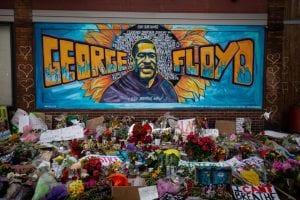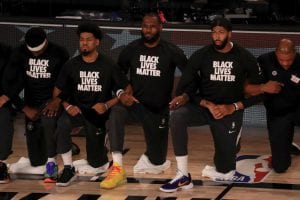Summer Round-Up #3: Protests, Police Reform, and Civil Unrest
September 9, 2020
 This summer has been more dramatic and more tumultuous than any other in recent memory. To help teachers and students explore key issues from this summer, we have done a series of summer round-up articles including developments related to the COVID-19 pandemic and our review of the 2020 campaigns and conventions. In our third and final summer round-up, we examine the protests and policy responses since Minneapolis police killed George Floyd in May. The police shooting of Jacob Blake in Kenosha, Wisconsin, reinvigorated the protests and demands for reform and justice.1
This summer has been more dramatic and more tumultuous than any other in recent memory. To help teachers and students explore key issues from this summer, we have done a series of summer round-up articles including developments related to the COVID-19 pandemic and our review of the 2020 campaigns and conventions. In our third and final summer round-up, we examine the protests and policy responses since Minneapolis police killed George Floyd in May. The police shooting of Jacob Blake in Kenosha, Wisconsin, reinvigorated the protests and demands for reform and justice.1
A Summer of Protests
Over the course of the summer, protests broke out and continued around the country. In major cities such as Portland, Oregon,2 and Louisville, Kentucky,3 protests have been daily or almost daily. The protests have ranged in their intensity and have evoked a wide array of responses from the media and public officials. Federal agents used tactics that raised alarm bells in Portland, grabbing suspected protesters from off the street in unmarked vans. Some called these actions kidnapping,4 and evidence suggests that they escalated the tension and violence in that city.5
LISTEN: From The Daily, “The Showdown in Portland”
In some cases, protests have coincided with violence and looting, frequently distracting the media and the public from the protesters’ cause.6 President Donald Trump has pointed to the violence as evidence that a greater police presence,7 and even a military presence,8 is needed. And, while polls showed that support for the Black Lives Matter movement was at an all-time high in the weeks following Floyd’s killing,9 that support has decreased as the protests have continued.10

Activists and advocates across the country are working to identify ways to keep pressure on policymakers and to keep their cause in the public eye. On August 28—the 50th anniversary of the March on Washington for Jobs and Freedom at which Martin Luther King Jr. delivered his “I Have a Dream” speech—the NAACP and other groups coordinated a virtual March on Washington.11 The family of Blake, the man shot by police in Kenosha, participated in that march.12 Athletes have also used their platforms to raise awareness. The NBA’s Milwaukee Bucks decided to boycott a playoff game, ultimately leading to a brief shutdown of the league.13
Summer of Reform
The protests have continued to shine a light on police practices and procedures that activists believe to be unjust. Some jurisdictions have instituted reforms. Many states and cities have banned the use of chokeholds and similar tactics. Cities and states have passed bills to make it easier to hold police officers accountable for wrongdoing.14 There are also newly instituted bans on the use of tear gas and no-knock warrants,15 the latter of which played a role in the police killing of Breonna Taylor.16
However, larger, more significant reform efforts have stalled. For example, in California, lawmakers proposed several bills that would have made police departments and records more transparent and that would have created civilian oversight commissions to investigate alleged instances of police brutality. Legislators decided not to take up those bills before the end of the session.17 Virginia legislators considered, but ultimately rejected, a bill that would have ended qualified immunity for police officers.18 Qualified immunity, established by the Supreme Court in a 1967 ruling, shields public officials from legal suits if the plaintiff is not able to establish that a clear violation of rights occurred before the case begins.19 This practice makes it difficult for people to bring cases against police officers and other civil servants. A Reuters analysis of data from qualified immunity cases found that in more than half of cases, police officers were protected from prosecution by the statute.20
At the federal level, there are several bills that have been introduced and, in some cases, passed by the House of Representatives. One such bill, the George Floyd Justice for Policing Act, passed the House in June.21 If it became law, this bill would make it easier to investigate, indict, and convict police officers for use of excessive force and would grant the Department of Justice more authority in examining patterns of abuse in police departments across the country. This bill has been introduced, but not yet debated, in the Senate.
Protesters’ most ambitious demand, the call to defund the police, remains unmet. In Minneapolis, the city council initially committed to disbanding the police department and replacing it with a Department of Community Safety and Violence Prevention and a Department of Law Enforcement.22 However, that effort has stalled in the city council until at least 2021.23
WATCH: From The Guardian, “What Does It Mean to Defund the Police?”
Defunding or abolishing police departments would be a significant change in state and local governments. It is a new idea to most Americans. Initial polling indicated that most Americans oppose the idea, but as people have learned more about it, those opinions have seemed to be in flux.24
WATCH: From PBS NewsHour, “Two Views on the Future of American Policing”
State and local governments across the country are grappling with questions about the future of policing, criminal justice, and issues pertaining to racial justice. And, during this election, some national politicians are calling for change at the federal level. Meanwhile, people across the country are protesting, hoping to keep these issues on the public agenda.
Discussion Questions
- Have there been protests in or near your community? What impact have they had?
- Do you have a mostly positive or mostly negative view of the protests? Why? Do your reasons have to do with what you see happening, your views on the issues, or both?
- Which of the suggested police reforms, if any, do you agree with? Why?
- Do you think the federal government should take action to reform policing, or do you think those efforts are best handled at the state and local levels?
- Do you support the George Floyd Justice in Policing Act? Why or why not?
- What do you think of the call to defund the police? Explain your answer.
Possible Extension Activities
- Have students read the George Floyd Justice in Policing Act and work together to write letters to their senators in support or in opposition.
- Ask students to research “defunding the police” or “abolishing the police” to understand the different ideas and policies involved in that demand. Resources embedded in this post provide good starting points, as does this overview from the Associated Press.
- After researching the ideas of defunding the police, ask students to design a model for providing/enforcing community safety. What would they prioritize? What agencies would they need? What would those agencies do?
Featured Image Credit: Getty Images
[1] CBS News: https://www.cbsnews.com/news/jacob-blake-sr-kenosha-wisconsin-police-shooting-victim/
[2] CNN: https://www.cnn.com/2020/09/02/us/portland-protests-wednesday/index.html
[3] National Public Radio: https://www.cnn.com/2020/09/02/us/portland-protests-wednesday/index.html
4] PolitiFact: https://www.politifact.com/factchecks/2020/aug/04/bob-casey/sen-bob-casey-said-federal-agents-kidnapped-protes/
[5] National Public Radio: https://www.npr.org/2020/08/06/899882025/portland-protests-de-escalate-as-federal-agents-leave-city-streets
[6] USA Today: https://www.usatoday.com/story/opinion/2020/08/31/riots-violence-erupting-turning-many-away-blm-and-protests-column/5675343002/
[7] Business Insider: https://www.businessinsider.com/trump-police-endorsement-speech-officers-fight-back-2020-8
[8] Council on Foreign Relations: https://www.cfr.org/in-brief/trumps-threat-use-military-against-protesters-what-know
[9] FiveThirtyEight: https://fivethirtyeight.com/features/support-for-black-lives-matter-surged-during-protests-but-is-waning-among-white-americans/
[10] Boston Globe: https://www.bostonglobe.com/2020/09/01/opinion/support-black-lives-matter-is-dropping-among-white-americans/
[11] NAACP.org: https://www.naacp.org/marchonwashington/
[12] Chicago Tribune: https://www.chicagotribune.com/suburbs/evanston/ct-jacob-blake-family-kenosha-protest-plans-20200828-f6xbocfmqbdzdfhzy46z753ssq-story.html
[13] CBS Sports: https://www.cbssports.com/nba/news/nba-boycott-how-players-reached-decision-to-resume-season-timeline-overnight-disagreement-owners-role/
[14] Minneapolis Star-Tribune: https://www.startribune.com/states-race-to-pass-policing-reforms-after-floyd-s-death/572051772/?refresh=true
[15] Axios: https://www.axios.com/police-reform-george-floyd-protest-2150b2dd-a6dc-4a0c-a1fb-62c2e999a03a.html
[16] USA Today: https://www.usatoday.com/story/news/factcheck/2020/06/30/fact-check-police-had-no-knock-warrant-breonna-taylor-apartment/3235029001/
[17] Los Angeles Times: https://www.latimes.com/california/story/2020-09-02/california-police-reform-bills-derailed
[18] ABC 8 News, Richmond, Virginia: https://www.wric.com/news/politics/virginia-house-rejects-bill-eliminating-qualified-immunity-for-police/
[29] Cornell Law School’s Legal Information Institute: https://www.law.cornell.edu/wex/qualified_immunity
[20] Reuters: https://www.reuters.com/investigates/special-report/usa-police-immunity-scotus/
[21] Congress.gov: https://www.congress.gov/bill/116th-congress/house-bill/7120/actions
[22] CNN: https://www.cnn.com/2020/08/06/us/minneapolis-police-abolish-delay/index.html
[23] Bloomberg: https://www.bloomberg.com/news/articles/2020-08-13/minneapolis-falters-in-plan-to-disband-the-police
[24] New York Times: https://www.nytimes.com/2020/07/03/us/politics/polling-defund-the-police.html







